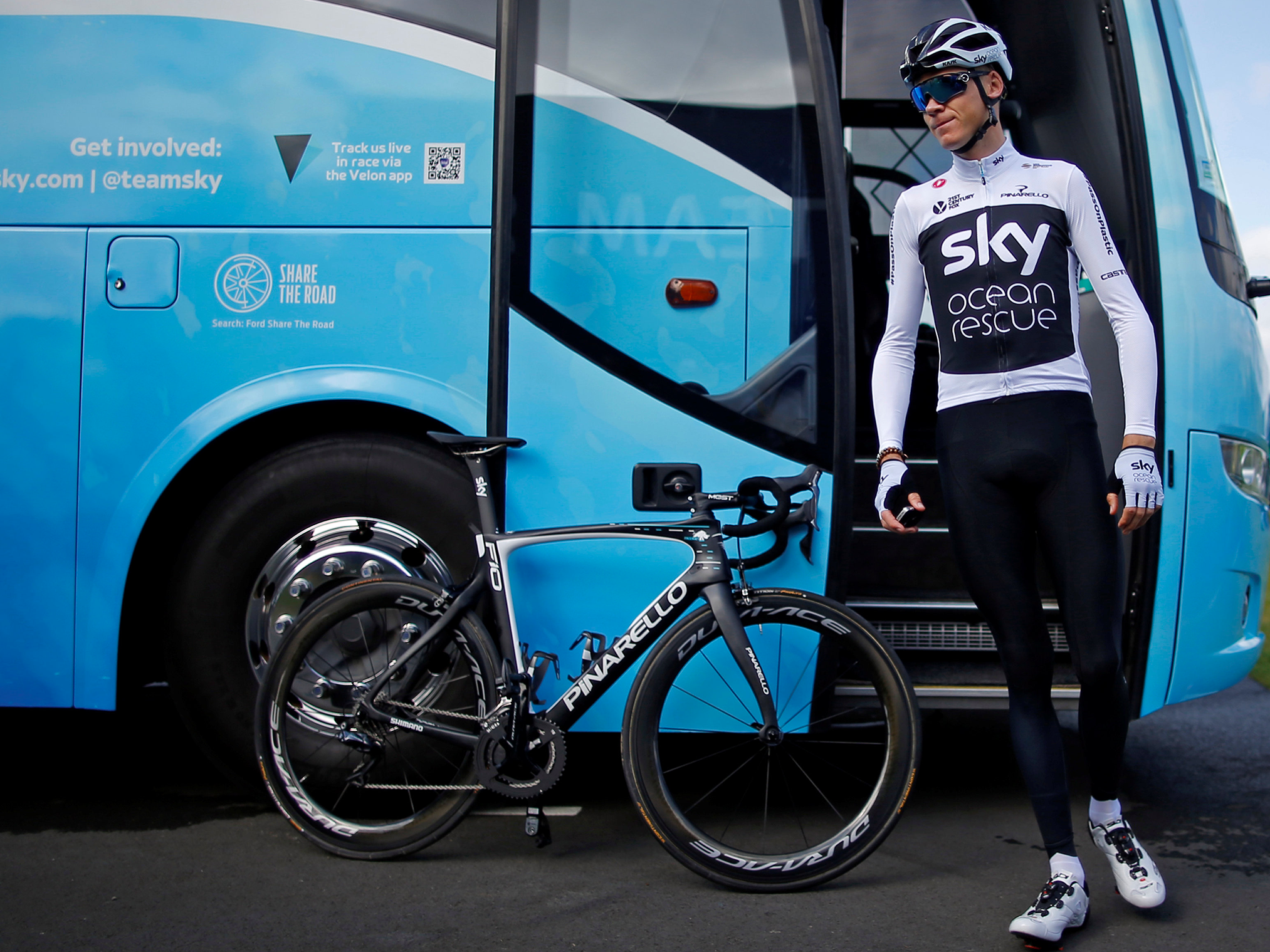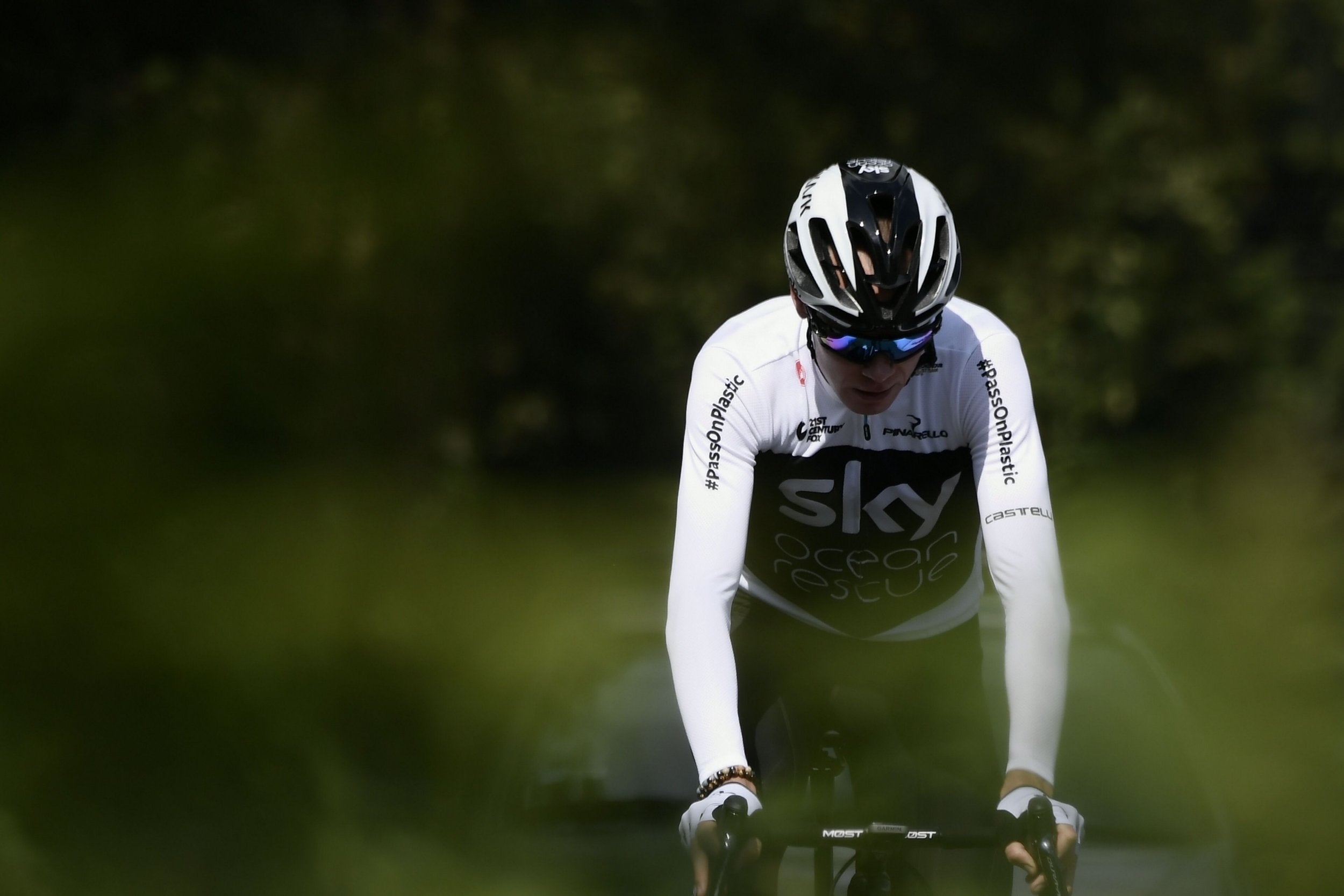Tour de France 2018: Chris Froome faces an uphill battle against history, rivalry, the peloton and the people
Preview: This race should be about 176 different shapes and sizes and skills and intentions lining up on the start line, but of course much of the attention will turn to Froome
There is something heartwarming about watching an elite sportsperson compete at something they’re not very good at. Cricket is the best place to find this scenario; Glenn McGrath was one of the greatest bowlers of all time, a genius of seam and a master of line and length, but you had friends with more batting prowess.
It is why we enjoy seeing midfielders don goalkeeping gloves, and unwitting centre-backs standing in the path of irresistible overhead kicks, and in a roundabout way it is one of the aspects of the Tour de France which makes it so compelling to watch. On Saturday 176 riders will line up at the Grand Départ, all different shapes and sizes and skills and intentions being forced out of their comfort zone: powerful sprinters hauling themselves over the Alps, spindly climbers bouncing over heavy cobbles, and raw debutants just trying to reach Paris in one piece.
This year those distinctions have been accentuated by what on the surface seems a minor change: each team now selects only eight riders rather than nine. Cutting 11 per cent of the squad means teams cannot afford to spread their risk with a sprinter and a puncher and a yellow-jersey contender all pulling in different directions. Team selection is a balancing act now more than ever, a high-wire trick which has brought about a number of different solutions.
Like the controversial decision by Australia’s Mitchelton-Scott team to exclude their homegrown sprint talent, Caleb Ewan. The team announced back in December that Ewan would be racing his first Tour and the 23-year-old geared his season accordingly, only to be told last month he would no longer be riding. After coming so close to glory with Simon Yates in the Giro d’Italia, Mitchelton-Scott have decided to throw all their weight behind Simon’s twin brother, Adam Yates, selecting a strong team with the primary mission of sacrificing themselves for the 25-year-old Briton.
Ewan’s omission is a boost for the out-of-form Mark Cavendish as he chases the four stage wins he needs to equal Eddy Merckx’s record of 34 – “If I don’t get them this time then I’ll make sure I get them before the end of my career,” he said this week – while the explosive young Colombian Fernando Gavaria could challenge four-time sprint king Peter Sagan for the green jersey, a year on from Sagan’s infamous clash with Cavendish.

But of course those are only the intriguing sub-plots, because the biggest story, win or lose, will be Chris Froome. After nine months in purgatory he was absolved of any wrongdoing in his Salbutamol case this week and will now attempt to join a legendary band of riders to have won five Tours.
He faces an uphill battle: against history which says the Giro-Tour double is near-impossible to pull off, against a brutal opening nine days of treacherous cobbles and crosswinds in 30 degree heat, against his own ageing legs, against a peloton desperate to bring him down, against Movistar’s triumvirate of Nairo Quintana, Alejandro Valverde and Froome’s former lieutenant Mikel Landa, against even his own team-mate Geraint Thomas, who sounds more and more like a man fed up of playing second fiddle.
But most of all, Froome faces a battle against the people. For Froome, past events might suggest the Tour de France roughly translates as tour of various cantons and communes which despise him. He was booed at Team Sky’s presentation on Thursday and received ominous threats on social media. Security was ramped up around his hotel and is set to be increased on the roadside, but only so much can be done to stop an angry man hurling his own freshly passed urine at you, as Froome found out three years ago.
So on Friday morning Froome attempted to smooth the road with an open letter published in Le Monde. The case was complex, he said. The French people are fair-minded, he said. I hope the shadow of doubt has been lifted, he said.
It is now 20 years since the Festina affair, when a truck-load of performance-enhancing drugs were uncovered and a scandal unravelled which brought the Tour to its knees. It has stumbled on gamely through hurtling waves of controversy, but each damaging story sows fresh seeds of suspicion.

The problem for cycling, and for Froome, is that suspicion is something you cannot evade. Suspicion doesn’t require admission or proof or a verdict from the UCI. It is fuelled by everything it touches: success, failure, denial, silence, firm evidence, a lack of evidence, the wrong kind of evidence. Which leaves us with a dilemma. How do you watch the Tour de France? How do you write about the Tour de France? Should you boycott or embrace? Should you sit back and enjoy or hurl freshly passed urine at the TV?
Perhaps the answer is somewhere in the middle, to watch with an open mind through narrowed eyes. To watch for the characters and the chaos and the pain, for the iconic mountains and the picturesque countryside, for the petty squabbles and the fierce rivalries, as 176 riders try to conquer three ludicrous weeks of cycling. To understand the history that both makes it and taints it. And, as ever with cycling, to never get too attached.
Join our commenting forum
Join thought-provoking conversations, follow other Independent readers and see their replies
Comments
Bookmark popover
Removed from bookmarks